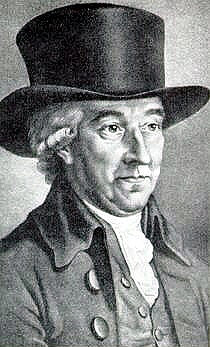Justus Möser facts for kids
Justus Möser (born December 14, 1720 – died January 8, 1794) was an important German lawyer and thinker. He is best known for his special history book about his hometown, Osnabrück. This book focused on the everyday lives of people and their culture.
A Life of Service and Ideas
Justus Möser was born in Osnabrück, a city in Germany. He studied law at the universities of Jena and Göttingen. After finishing his studies, he returned to Osnabrück to work as a lawyer.
His fellow citizens quickly saw how talented he was. They appointed him as advocatus patriae, which means a lawyer who works for the public or the state. From 1762 to 1768, he served as the justiciarius, or chief judge, of the criminal court in Osnabrück. In 1768, he became a Geheimer Referendar, which was a special advisor to the government.
For 20 years, Möser was the legal advisor for the Prince-Bishop of Osnabrück. This leader was Prince Frederick, Duke of York and Albany, who was a son of King George III of the United Kingdom.
Möser's Writings and Thoughts
Besides being a statesman and administrator, Möser was also a writer and historian. His history book about Osnabrück, published in 1768, was very well-regarded.
He also wrote a collection of essays called Patriotische Phantasien (meaning "Patriotic Fantasies"). In these writings, he believed that a state should grow naturally, like a plant. He thought that laws should not be forced upon people by rulers. Instead, laws should develop from the traditions and needs of the community.
Möser's ideas were quite unique for his time. A historian named Jerry Muller noted that Möser worried about the growth of capitalism. Capitalism is an economic system where businesses are owned by private people, not the government. Möser felt that this new way of doing business could change old traditions. He thought it might make people focus too much on making money. This could lead them to forget their duties to their community and public life.
Möser's ideas were different from those of his famous contemporary, Adam Smith. Smith is known for his ideas about free markets. Möser's thoughts also influenced later German thinkers. Some people see Möser as a German version of Edmund Burke. Burke was a famous thinker in England who also believed in traditional ways.
Möser also wrote other works, including Vermischte Schriften (Mixed Writings). These writings showed his understanding of human nature and his sense of humor. He was also a poet and wrote a play called Arminius in 1749. He even wrote short stories, including a funny letter from a lady.
Legacy and Recognition
Justus Möser passed away in his hometown of Osnabrück. A statue of him was put up in Osnabrück in 1836.
His complete works were published in 10 volumes between 1842 and 1844. The famous German writer Johann Goethe was interested in Möser's writings. Goethe even included information about Möser in his own autobiography.
 | Percy Lavon Julian |
 | Katherine Johnson |
 | George Washington Carver |
 | Annie Easley |


